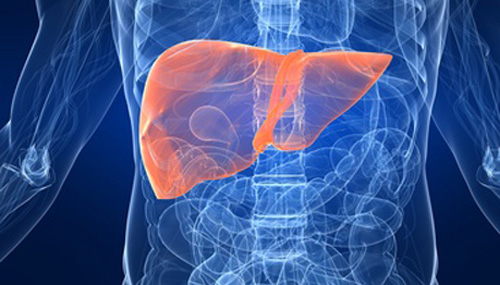Scientists at the University of Iowa say they have identified an unexpected molecular link between liver cancer, cellular stress, and these health problems that increase the risk of developing this cancer. Their study (“The Stress-Regulated Transcription Factor CHOP Promotes Hepatic Inflammatory Gene Expression, Fibrosis, and Oncogenesis”) is published in PLOS Genetics. It shows that a protein called CHOP, which had previously been thought to generally protect against cancer, actually promotes liver cancer in mice and may do the same in humans.
“Obesity, alcoholism, and viral hepatitis are all known independently to cause cellular stress and to induce expression of CHOP,” said Thomas Rutkowski, Ph.D., assistant professor of anatomy and cell biology in the UI Carver College of Medicine and senior study author. “So this finding suggests a biological pathway that links those ‘upstream’ health problems to liver cancer at the end.”
CHOP is a transcription factor that is produced when cells experience certain kinds of stress. It is known to promote cell death. Usually, factors that promote cell death protect against cancer by causing damaged cells to die.
The study shows that, despite its role in cell death, CHOP actually is elevated in liver tumor cells in mice. Furthermore, mice without CHOP are partially protected from liver cancer, developing fewer and smaller tumors than the normal mice in response to liver cancer-causing drugs. The mice without CHOP also had less liver scarring and inflammation than mice with the protein.
“We show that CHOP expression is up-regulated in liver tumors in human HCC [hepatocellular carcinoma] and two mouse models thereof. CHOP-null mice are resistant to chemical hepatocarcinogenesis, and these mice exhibit attenuation of both apoptosis and cellular proliferation,” wrote the investigators. “CHOP-null mice are also resistant to fibrosis, which is a key risk factor for HCC. Global gene expression profiling suggests that deletion of CHOP reduces the levels of basal inflammatory signaling in the liver. Our results are consistent with a model whereby CHOP contributes to hepatic carcinogenesis by promoting inflammation, fibrosis, cell death, and compensatory proliferation.”
“We turned out to be completely wrong about CHOP. We found that it contributes to the development of liver cancer in mice and is associated with liver cancer in humans,” continued Dr. Rutkowski. “CHOP is indeed killing cells, just as we thought it would, but we think the consequence of this killing is not the prevention of tumors, but instead the stimulation of inflammatory signals in the liver that cause excessive proliferation of other cells.”
Having implicated CHOP as a contributing factor in liver cancers associated with obesity, alcoholism, and hepatitis, Dr. Rutkowski next wants to learn whether CHOP acts early in the process of tumor formation or if it plays a role in helping established tumors to grow. He also is interested in identifying the other proteins that partner with CHOP to promote liver cancer.
“This discovery opens up an avenue into a new pathway that promotes liver cancer,” explained Dr. Rutkowski. “Once we know what those other genes are that interact with CHOP, then maybe we can find a druggable target molecule. The hope is that down the line scientists will be able to convert that finding into something therapeutically useful for patients.”


